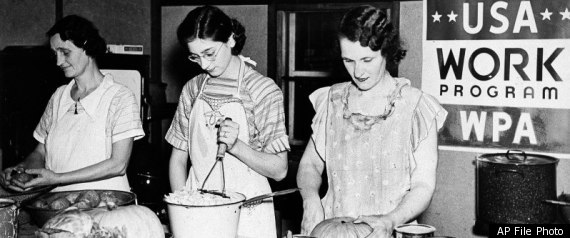 The woman -- dressed in a crisply-ironed blue dress, practical and polished flats and the perfect shade of red lipstick to complement her smooth alabaster skin and ebony hair -- approached the microphone. What she said next made the audience at an October forum on joblessness gasp.
The woman -- dressed in a crisply-ironed blue dress, practical and polished flats and the perfect shade of red lipstick to complement her smooth alabaster skin and ebony hair -- approached the microphone. What she said next made the audience at an October forum on joblessness gasp."Ladies and gentlemen, I stand before you," Gayle Leslie said, "as a woman with a college degree, as someone who is incredibly well networked, congenial, flexible and determined and who has never stopped looking for work. But after almost three years without a job, I am also the face of homelessness."
The last time Leslie had a full-time job, she was responsible for producing voters for Barack Obama. Today, the 51-year-old former copywriter and event planner, is homeless.
Much ink has been spilled covering the so-called "mancession," and men's plight in the current recovery. Earlier this year, in a story titled "Dead Suit Walking," Newsweek asked readers to consider what would become of men after a decade of declining wages. In November, a piece in The Atlantic titled "All the Single Ladies," explored how men's economic decline has impacted women's search for romance. The piece generated so much online traffic that a producer optioned it for a possible television show.
Women's struggles are less well-known. "It's one of those things that has somehow stayed under the radar," said Joan Entmacher, vice president for Family Economic Security at the National Women's Law Center, a Washington, D.C.-based think tank.
Sixty-six percent of the government jobs lost since the recovery began were once held by women, according to a Women's Law Center analysis released Tuesday. Indeed, for women, much of the current joblessness, Entmacher said, traces back to the push to trim the size and spending of government. Congress has refused to pass bills that would have saved thousands of government jobs held by women, or that earmarked funding to create jobs for underrepresented groups in male-dominated industries such as construction.
On Friday the Labor Department announced that the unemployment rate among women fell to 7.8 percent in November from 8 percent the month before. The slight improvement belies the fact that the unemployment rate for women has been fairly stagnant since the recovery began in June 2009. Men have done better: Unemployment for men was 8.3 percent in November, down from 9.9 percent at the start of the recovery.
The reasons that men have regained jobs at a faster clip than women and have seen their collective situation improve since the recovery began are hard to explain, said Entmacher. "It isn't as if male-dominated industries have suddenly and really rebounded," she said.
The anecdotal stories that Entmacher hears from middle-aged and older women, left struggling with their finances and their identities, suggest that there's also a belief lingering in the culture that it's more important to put unemployed men back to work, she said.
Many believe that women will eventually see the same improvements in their job situation as men.
"I think with the changes that are happening in our culture and in our economy things that many women seem to do so well -- communicate, collaborate, multi-task and endure -- are in demand. We are poised to eventually fair really well," said Vicki Milazzo, an author of this year's "Wicked Success is Inside Every Woman," a New York Times bestseller.
Milazzo's words are cold comfort to many of the middle-aged women like Leslie who spoke to The Huffington Post recently.
After a childhood in Texas with what Leslie says are her dysfunctional parents, she thought she was on her way to a good and independent life when she graduated from college and moved to Manhattan in the 1980s.
"I always had these great apartments, and managed to make money," said Leslie, who never married.
After a few years, Leslie landed jobs coordinating major events like the Gotham Awards and celebrations at places such as St. John the Divine. She got into fundraising for nonprofit agencies and eventually moved on to the work of copywriting ads. In 2008, both of Leslie's now divorced parents were also coping with health problems so serious that she didn't expect one of them to live. "So I decided to go home and try again to do the good daughter thing," Leslie said.
The situation was fraught. Her father was so passionately opposed to Obama being elected that his pre-meal prayers included the n-word and a request that Obama lose. Then, one night Leslie awoke to find her stepmother in her room expressing disdain for sinners and, Leslie thought, people like her. Leslie felt she couldn't stay. But, her savings had dwindled to practically nothing.
Leslie found a spot at the local women's emergency shelter then got a job with the Walker County Democratic Party. When the election was over, Leslie was able to get back to New York. She lived on her unemployment benefits, thinking it would be a matter of time before she found a job. Then in 2010, the benefits ran out.
Now, she's depending on the kindness of friends. She splits her time between sending out resumes, hunting for her next temporary sleeping spot and writing a book about her life. To get by, Leslie rations everything -- subway passes, cellphone minutes and even that red lipstick -- so that she will have them if, and when, she gets a job interview.
Origin
Source: Huff
No comments:
Post a Comment